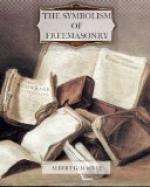XXIV.
The Ineffable Name.
Another important symbol is the Ineffable Name, with which the series of ritualistic symbols will be concluded.
The Tetragrammaton,[122] or Ineffable Word,—the Incommunicable Name,—is a symbol—for rightly-considered it is nothing more than a symbol—that has more than any other (except, perhaps, the symbols connected with sun-worship), pervaded the rites of antiquity. I know, indeed, of no system of ancient initiation in which it has not some prominent form and place.
But as it was, perhaps, the earliest symbol which was corrupted by the spurious Freemasonry of the pagans, in their secession from the primitive system of the patriarchs and ancient priesthood, it will be most expedient for the thorough discussion of the subject which is proposed in the present paper, that we should begin the investigation with an inquiry into the nature of the symbol among the Israelites.
That name of God, which we, at a venture, pronounce Jehovah,—although whether this is, or is not, the true pronunciation can now never be authoritatively settled,—was ever held by the Jews in the most profound veneration. They derived its origin from the immediate inspiration of the Almighty, who communicated it to Moses as his especial appellation, to be used only by his chosen people; and this communication was made at the Burning Bush, when he said to him, “Thus shalt thou say unto the children of Israel: Jehovah, the God of your fathers, the God of Abraham, the God of Isaac, and the God of Jacob, hath sent me unto you: this [Jehovah] is my name forever, and this is my memorial unto all generations.” [123] And at a subsequent period he still more emphatically declared this to be his peculiar name: “I am Jehovah; and I appeared unto Abraham, unto Isaac, and unto Jacob, by the name of El Shaddai; but by my name Jehovah was I not known unto them.” [124]
It will be perceived that I have not here followed precisely the somewhat unsatisfactory version of King James’s Bible, which, by translating or anglicizing one name, and not the other, leaves the whole passage less intelligible and impressive than it should be. I have retained the original Hebrew for both names. El Shaddai, “the Almighty One,” was the name by which he had been heretofore known to the preceding patriarchs; in its meaning it was analogous to Elohim, who is described in the first chapter of Genesis as creating the world. But his name of Jehovah was now for the first time to be communicated to his people.
Ushered to their notice with all the solemnity and religious consecration of these scenes and events, this name of God became invested among the Israelites with the profoundest veneration and awe. To add to this mysticism, the Cabalists, by the change of a single letter, read the passage, “This is my name forever,” or, as it is in the original, Zeh shemi l’olam, as if written Zeh shemi l’alam, that is to say, “This is my name to be concealed.”




